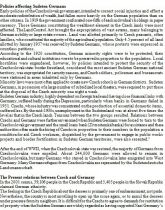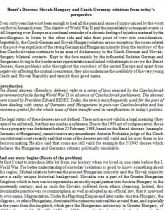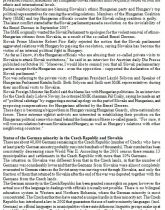Semestrálna práca: Beneš’s Decrees: Slovak-Hungary and Czech-Germany relations from today’s perspective
Skryť detaily | Obľúbený- Kvalita:83,1 %
- Typ:Semestrálna práca
- Univerzita:Univerzita Mateja Bela v Banskej Bystrici
- Fakulta:Fakulta politických vied a medzinárodných vzťahov
- Kategória:Humanitné vedy
- Podkategória:Politológia
- Rozsah A4:13 strán
- Zobrazené:1 713 x
- Stiahnuté:6 x
- Veľkosť:0,1 MB
- Formát a prípona:MS Office Word (.doc)
- Jazyk:anglický
- ID projektu:3904
- Posledna úprava:23.06.2017
Even sixty years have not been enough to heal all the pain and sense of injury caused by the worst conflict in human history. The shadow of World War II and the immediately subsequent events is still lingering over Europe as a continual reminder of a chronic feeling of injustice nurtured by the unwillingness to listen to the other side and take their point of view into consideration. Regrettably, the Czech-German and Slovak-Hungary relations are no exception: the issues related to the post-war expulsion of the strong German and Hungarian minority from the territory of the then Czechoslovakia continue to be an area of disharmony in the Czech-German and Slovak-Hungary bilateral contacts. Kept to the fore mainly by the influential Sudeten German and Hungarians living in the border areas representation and linked with attempts to revise the Beneš Decrees, these problems echo throughout the corridors of the united Europe and apart from negatively affecting the mutual coexistence, they also undermine the credibility of the very young Czech and Slovak Republic and tarnish their good name.
Introduction
The Beneš decrees (Benešovy dekrety) refer to a series of laws enacted by the Czechoslovak government of exile during World War II in absence of Czechoslovak parliament. The decrees were issued by President Edvard BENES. Today, the term is most frequently used for the part of them dealing with status of Germans and Hungarians in post-war Czechoslovakia and has become a symbol for the whole issue of their transfer and its ramifications in today's politics.
Introduction
The Beneš decrees (Benešovy dekrety) refer to a series of laws enacted by the Czechoslovak government of exile during World War II in absence of Czechoslovak parliament. The decrees were issued by President Edvard BENES. Today, the term is most frequently used for the part of them dealing with status of Germans and Hungarians in post-war Czechoslovakia and has become a symbol for the whole issue of their transfer and its ramifications in today's politics.



